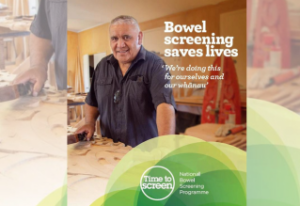30 July 2024
Our charity remains committed to achieving equity within our bowel screening programme and highlighting where, as a country, we can and should be doing better to reduce bowel cancer rates.
We were extremely pleased with the coverage we gained from our recent media release voicing our concern for the slow roll out of the Māori and Pasifika from age 50 screening program that was announced back in 2022.
Health Minister Shane Reti has responded, saying, “This government remains committed to lowering the bowel screening age for all New Zealanders, as we indicated during the campaign. I expect to see advice in the coming months as to how this could be achieved.”
This underscores why we are calling for a clear timeline and accountability with Te Whatu Ora’s director of prevention Alana Ewe-Snow, stating the national rollout of the bowel screening age extension for all districts required ministerial approval. “This did not gain ministerial approval before the 2023 election. The tentative project timeline that was shared regarding the rollout is now outdated.”
Our charity is questioning whether Te Whatu Ora: Health New Zealand plans to complete this rollout urgently or whether it was just a token effort in three regions.
“Far too many Māori and Pasifika are dying that could have a fighting chance if they were screened from 50,” says Bowel Cancer NZ medical advisor, Professor Sue Crengle.
Our thanks to Professor Crengle, who continues to be vocal on behalf of Bowel Cancer NZ, calling for change in this area – speaking to RadioNZ, Newstalk ZB, StuffNZ, Te Karere and other media outlets to get our advocacy message across.
We are already on the back foot with the latest research showing the screening age for Māori and Pasifika needs to be lowered as soon as possible. A study published in May 2024 by the University of Otago highlighted this.
The lead author of the study Dr Oliver Waddell says, “Māori are more likely to die from their disease than non-Māori, and also more likely to be diagnosed with stage 4 advanced disease…We believe screening for average-risk people in New Zealand should start at least age 45.”.
Showing the need for the nationwide screening program for Māori and Pasifika to be lowered immediately to 50 in order to save lives and help in the fight to prevent late-stage diagnosis.



